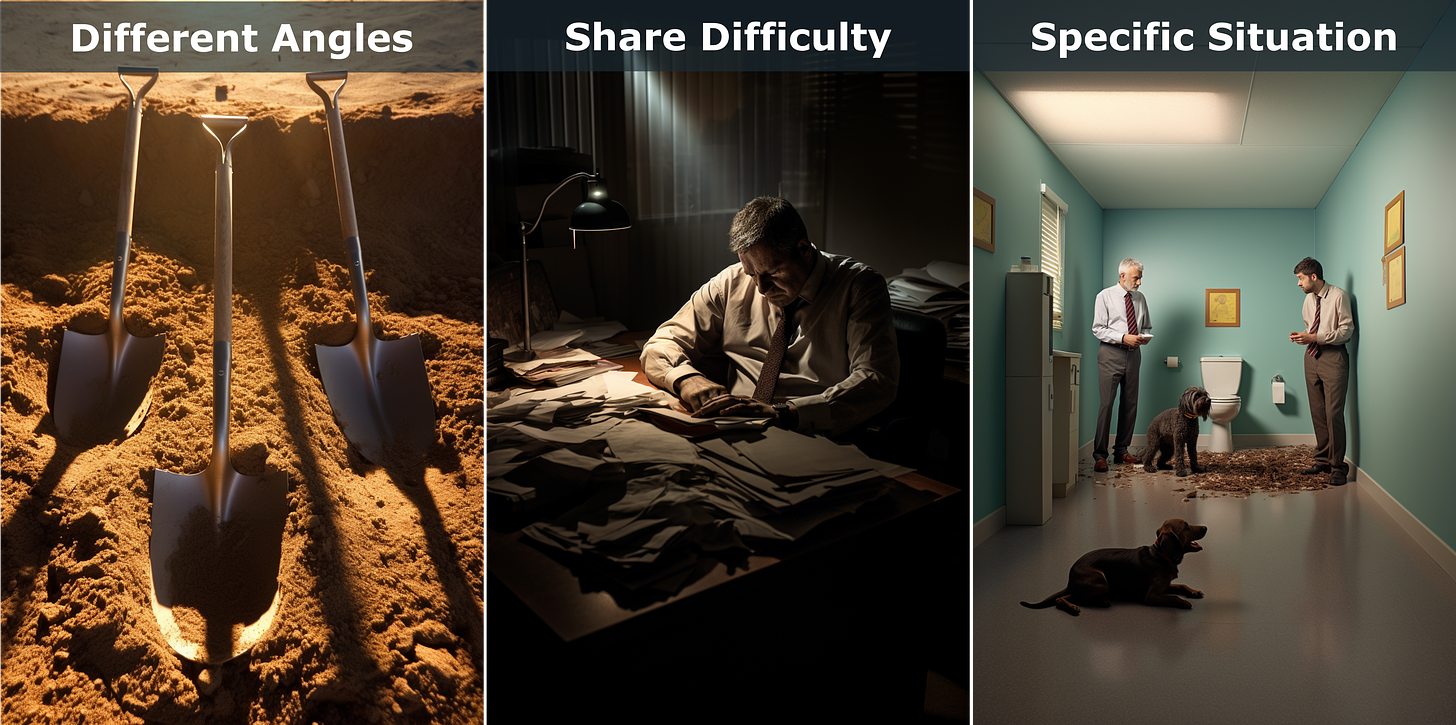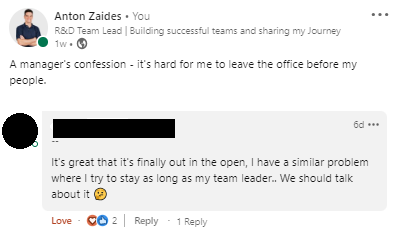There’s a single question the 30 team leaders I talked to couldn’t answer well:
“What would your developers say you need to improve?”
Bad managers have many problems, but most of them know it. Good managers have a few invisible ones.
This is often the case:
You come to the performance review. You give your input. In the end, you ask for feedback. And then… Silence.
At best “Oh I really enjoy working with you! Everything’s great!”
There is ALWAYS something you can improve. Things that seem minor to your people now, can be a huge blind spot for you further in your career.
3 methods to get the best feedback you ever got:
Try different angles
Sharing your difficulties
Make it about a specific situation
Try Different Angles
The question “Where do you think I can improve?” often results in silence. When you are staying content with the usual answer, you are missing a golden opportunity.
4 years ago I had an ‘aha’ moment.
It was during a conclusion talk I had with a developer, before moving to a different role. That’s how the conversation went (name changed):
Anton: “So before we finish, I would like to get some feedback from you. Where do you think I could improve on?”.
Anna: “Hmmm… I enjoyed working with you! I think you did a great job, I can’t think of anything right now”.
(side note - if you ask them to think and get back to you, forget about a response).
Anton: “Thanks! But I’m sure there are things I could do better. A behavior you didn’t like, maybe something the team as a whole could have done better?”
Anna: “No really… I think the team performed great. I let you know if I come up with anything!”
(note - DON’T GIVE UP HERE)
Anton: “Ok, what about things related to you? Do you feel I helped you in your professional growth, our 1:1s were effective, you got good feedback?”
Anna: “Now that you raise it… I didn’t like the way you gave me feedback. You always waited for the end of the 1:1. You started with the small talk. Then we talked about personal issues and my progress. Only in the end, you gave criticism. After a couple of times, it made me just want the first part of the 1:1 to be over, so you could get to the point. I didn’t want to share things with you anymore. I would have much preferred a separate conversation for the feedback.”
It BLEW MY MIND.
This feedback was SUPER useful. I was stuck at ‘Ruinous Empathy’, as Kim Scott framed it in ‘Radical Candor’ (a highly recommended book).
This is the first time I heard such feedback, and I’m sure it also affected other developers I managed.
The key here was trying different angles, and not giving up.
Share your difficulties
This is a recent story. I shared something I struggle with on LinkedIn, and one of my developers responded:
That made me cringe inside. How come we are having such an important conversation on a social network?? What’s the LinkedIn content worth if I don’t even know my team’s thoughts?
Sharing what you struggle with is important (Brene Brown covers it in depth in ‘Dare to Lead). It makes people comfortable to share their own difficulties and give sensitive feedback.
Make it about a specific situation
Often your people won’t give you feedback because they like you. They won’t feel comfortable criticizing YOU, as a person.
The best way to resolve it is to make the feedback not about you, but about a situation. From that, you can derive what were the parts you didn’t do well, and how YOU can improve.
A couple of years ago, we had an important project with a very short deadline. We worked hard, delivered on time, and I was very happy was the result.
I asked each of the developers how they think the project went. This is how the conversation with Tom (name changed) went:
Anton: “What are your thoughts on Project X, now that it’s over? I would love to hear some feedback, on what I could have done better”
Tom: “The deadline was wayyy too short. We worked our asses off, and I think it’s not going to work in the long term. But I really enjoyed the work together, it was a good experience overall.”
(note - it can be tempting to stop with that obvious feedback. But the timeline was out of my control at that time, so no real lessons to learn)
Anton: “Yeah, I agree. I’ll try to make sure we have more reasonable timelines. What else could I have done better?”
Tom: “Hmmm.. Not much, it was good teamwork and an interesting project”.
Anton: “Let’s say we had to do the same project in the same timeline, what you would have changed in how we did it?”
Tom: “You know… I feel we always [emphasize mine] sacrifice the quality. The CRs are approved really fast, and we are too used to having tons of bugs. Even when there is no real rush, this habit kicks in.”
That was new to me. I didn’t know he felt that way. Until this day, I’m too lax with CRs (being more of a skimmer). That feedback helped me realize the effect it has on the team, and mitigate that (by involving people who can counter me).
Summary
To get valuable feedback, you have to dig deep.
3 methods that could help you:
Try different angles - use different questions, raise different areas you want to get feedback on.
Share your difficulties - it can help people in criticizing you (as you show them how you do it yourself)
Make it about the situation: “Where can I improve?” → “What could we have done better with project X?”
See you next week!







Anton, Thank you very much.
I learned some lessons from this article, and I'm sure it can help many team leaders too.
About your side note: "If you ask them to think and get back to you, forget about a response" -
I've noticed that for some developers, the "offline" thinking lets them find the real issues. Remember that they don't think all the time about the things that you can improve. Sometimes they need to remember a specific situation or a specific feeling they experienced when you acted wrongly in their opinions, so it may take them time, and it can be embarrassed to start thinking about it in a face-to-face meeting. It can sometimes even feel like a Black-out.
A good tip for this type of developer is - to ask them to **write down** the feedback, not only "get back with it". It'll force them to talk honestly about all the issues they want you to improve on in the next 1:1 meeting, and prevent them from thinking about how and what to say in front of you.
Anton, I read it and found it enjoyable! Thanks and waiting for more content :)